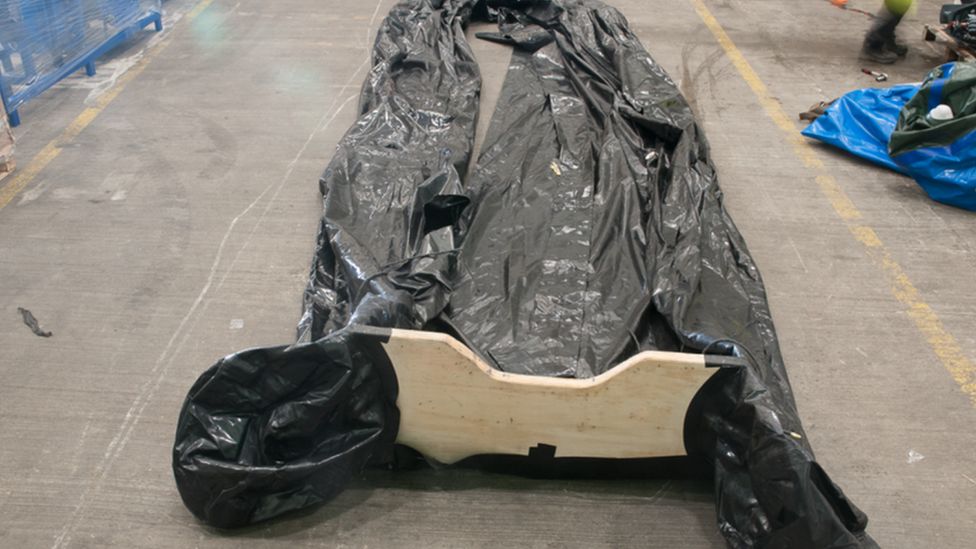
A man who piloted a boat in the English Channel has been found guilty of the manslaughter of four migrants who drowned when it ran into difficulty.
He had claimed that he was forced by violent smugglers to make the journey with at least 43 other migrants.
A jury at Canterbury Crown Court also found Bah guilty of facilitating a breach of immigration law.
The case is the first time a migrant who navigated an inflatable has been found responsible for harm caused to other occupants, the BBC’s home and legal correspondent, Dominic Casciani, said.
Bah previously told the court he had changed his mind about piloting the boat to the UK when he arrived at the beach on the French coast and saw it was too small for the number of passengers.
The home-built, low-quality inflatable should not have held more than 20 people.
But he claimed he was assaulted by smugglers and threatened with death if he did not go ahead with the crossing.
Duncan Atkinson KC, prosecuting, said as the pilot, Bah owed them a “duty of care to ensure their safety and protect them from the overwhelming risk to their lives”.
Libby Clark, a specialist prosecutor for the Crown Prosecution Service, said: “He could’ve turned back. That’s what some of the migrants wanted to do.
“But Ibrahima Bah carried on. Those aren’t really the actions of somebody who’s acted under duress.”
Bah, whom a court determined was an adult but whose exact age is in dispute, will be sentenced on Friday afternoon.
He was found guilty by the jury by a majority of 10 to two of four counts of gross negligence manslaughter, which the CPS describes as where a death is a result of a grossly negligent act or omission on the part of the defendant.
Bah was also found guilty unanimously of facilitating illegal entry to the UK.
The jury in a previous trial, held last summer, was dismissed after being unable to reach a verdict.
The court heard that a crew on a British fishing boat came across the sinking boat and tried to rescue the passengers, with help from the RNLI, air ambulance and UK Border Force.
A total of 39 survivors were brought to shore in Dover. But the exact number of migrants who drowned is unknown, as it appears at least one person’s body believed to have not been recovered.

Many of the passengers, not all of whom had life jackets, paid thousands of euros to smugglers.
Ms Clark said the crossing “on a sober and reasonable analysis was almost bound to fail”.
‘Could’ve gone back’
She said there was “no direct evidence of Bah being assaulted other than what Bah says”, and that was not a “tenable defence”.
“If we consider his actions as that boat went forward, he could have refused to have got in,” said Ms Clark.
“He could’ve gone out in the boat for a small distance if he was in fear and then gone back because it was too dangerous in his opinion.”
“But he kept going even when after about half an hour into the voyage, that boat was taking on water and people were hearing sounds of puncturing and hissing as the boat deflated.”
One of the four who lost their lives was named as Hajratullah Ahmadi. The other three were described as “unknown”.
Mr Atkinson said Bah did not have training or experience, while the boat had no lights or safety equipment such as flares.
The journey was navigated by two Afghan men at the front of the boat using mobile phones.
After being rescued from the Channel, Bah told police he travelled from Senegal to Mali, Algeria and Libya, before travelling by boat from Libya to Italy using smugglers.
One of the passengers, Ahmadi, from Afghanistan, told BBC South East he was on the boat but could not tell who was driving because it was “really dark”.
He did not give evidence during the trial.
After attempting to push out water from the boat with a bottle, he said he went into the sea to try to swim to the fishing boat.
Because it was so cold, he felt like he had “died after about five minutes” and described seeing other people in the water.
“One person didn’t have a safety jacket. I swam over to him but after two minutes I left him because I realised he was dead,” said Ahmadi.
Det Ch Insp Neil Kimber, who led the investigation, said: “Today marks the end of a complex investigation carried out by officers of the Kent and Essex Serious Crime Directorate.
“Our thoughts remain with the families of the victims who lost their lives during that crossing.” https://bagaimanacaraya.com/